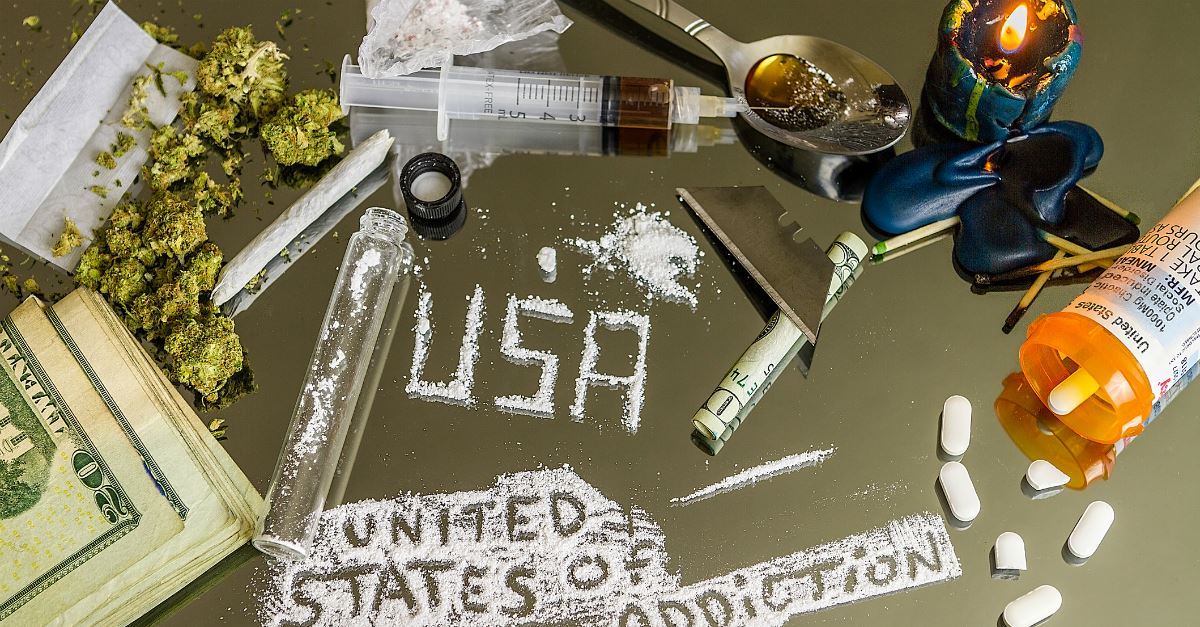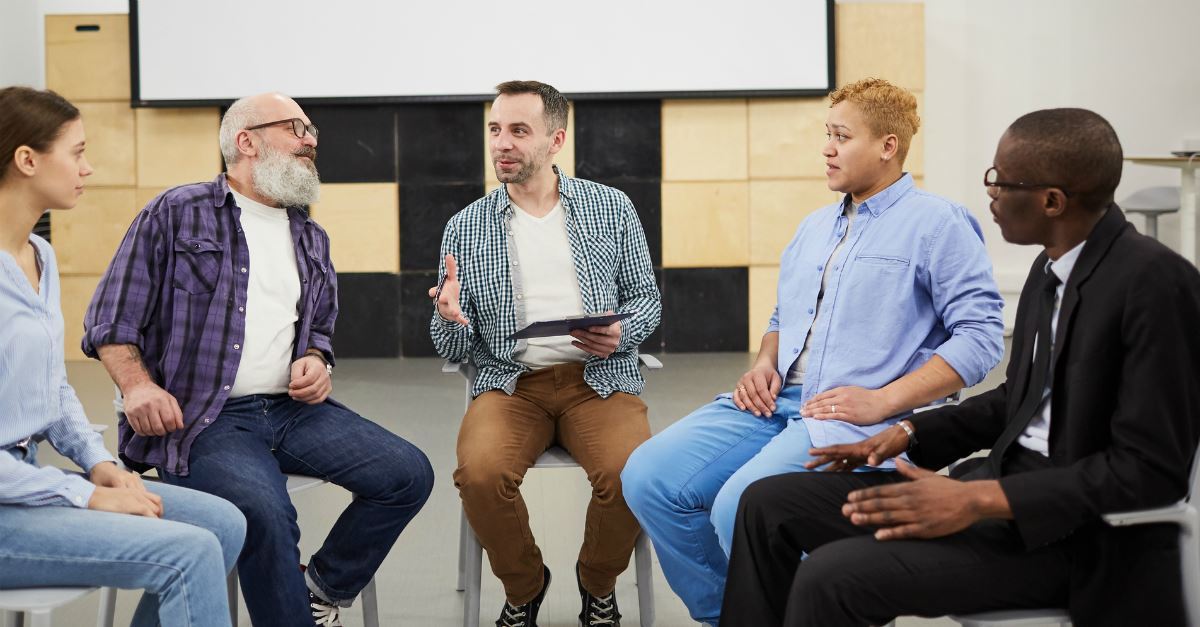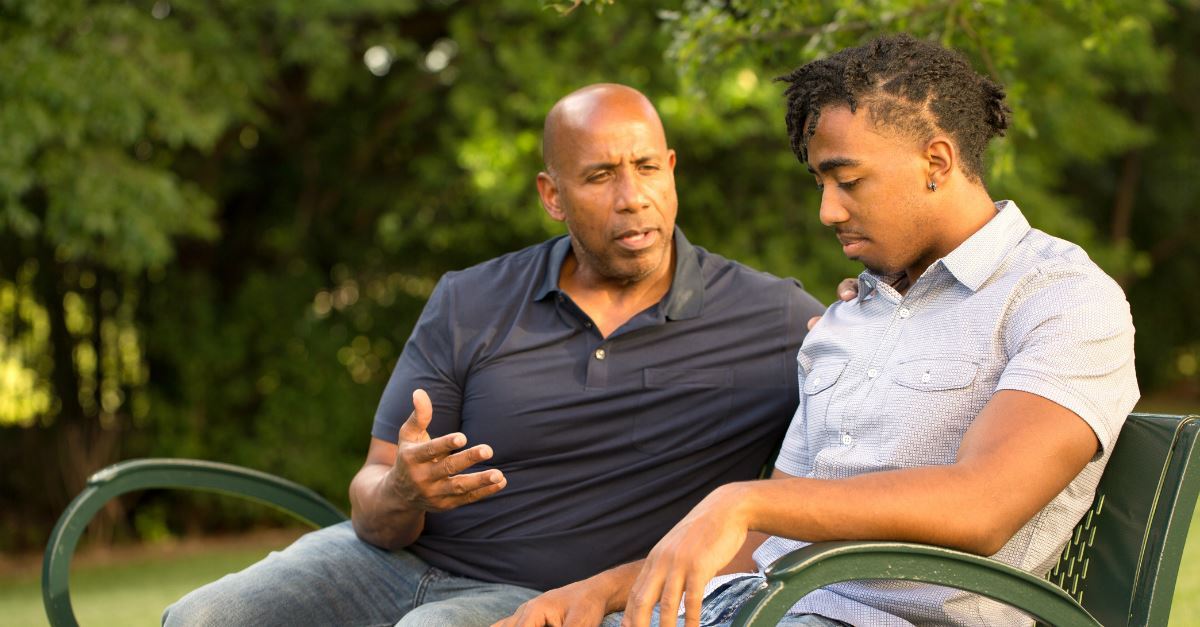
Americans are said to consume about 80% of the world’s supply of opium-derived painkillers.
More than two million of us are addicted to oxycodone and hydrocodone, and another 460,000 to heroin and fentanyl.
The threat of opioids killing someone you love is not a scandal, or a secret. It is an imminent cry for action.
To understand what’s at the heart of society’s call for change, I was honored by the heart of one mom, Jennifer Alba, who is fighting the good fight. Jennifer courageously shares her son’s heartbreaking story of death by overdose, and invites others to freedom – on her mission to save lives.
Starting with marijuana use at 13, Jennifer’s son Joseph became addicted to crack cocaine, Xanax, and alcohol for 16 years. Suffering with ADHD as a child, Jennifer shared that mental health challenges drove most of his addiction.
Photo Credit: ©GettyImages/Katarzyna Bialasiewicz
On Labor Day weekend, Jennifer let go of her oldest son into heaven.

When police arrived with the unthinkable news, God called her to champion a cure.
Jennifer writes in Joseph’s online tribute: “Your children aren’t supposed to die before you. It’s not natural. They are part of you just like your arm or your hand. When they die, a large part of you goes with them. It’s not something you can control. It’s not something you can ever get back. Yes, I have other children and I thank God every day for them. When you have children that are alive and that are dead, it’s like standing on an invisible like between life and death. You want so badly to be with all of your children. It’s instinctive.”
She continues, “Joseph was a kind and sensitive soul. He didn’t want to be an addict. He didn’t want any of this. He wanted to live a normal life. He wanted to be a successful DJ and he wanted to become a substance abuse counselor at one of the rehab centers he went to. He had a knack of talking to and helping others. He had a big heart…his life mattered.”
And yet, Jennifer lamented during our interview, online commenters say he deserved to die. They call him names. They callously forget that we’re called to be the body of Christ.
In Jennifer’s painful journey, she has learned the hard way that leaders must initiate.
Right now, parents and pastors need to open up, educate, and invite. Conquering the stigma of addiction or overdosing has to become a combined and concentrated effort, if we are to have any chance at overcoming.
Taking her petition to heart, here are 8 critical appeals to everyone shepherding souls in the midst of the opioid crisis:
Photo Credit: ©Unsplash
1. Open wide the doors, and continually seek truth.

The first step in understanding how much we’re all in this together, is to soften your heart and throw open the doors of conversation.
Ask, share, question, and continually pursue the facts on why and how this disease needs action. Talk about it, in school, at home, everywhere – treat the fight like an exercise program, or a new course of mindfulness.
Then start – and keep – seeking the truth.
One truth Jennifer shared is that “Fentanyl is a game-changer. It’s 100 times more potent than morphine. Any drug can be laced with Fentanyl and the person taking it has no idea. Dealers can press it into pills and you wouldn’t know. This means someone can take one pill and die.”
Truth also is, you can die just by inhaling the dust from Fentanyl. Just a few grains of Fentanyl can kill. The Drug Enforcement Agency reports that the lethal dose of fentanyl, and a similar drug, carfentanil, can be as small as 2,000 micrograms or just 2 mg. That’s equivalent to a few grains of sand, or a pinch of salt at most.
Jennifer explained it’s critical we face that addiction recovery is never “one size fits all.” She’s convinced that 30-day treatments for rehab are not enough, they are simply all that most insurance companies will cover. And the success rate is only 5-10%. Statistics show that opiate relapse rates tend to be higher than the 40%-60% relapse rates seen with other addictions.
To clarify, Jennifer offered, “Rehab doesn’t work because they don’t focus on the individual. They just give you 30 days to get your head a little bit clear; but that’s all it does.”
Over 70,000 Americans died in 2017 from an overdose. That's nearly 200 people every day. It’s equivalent to a commercial airliner crashing each day. It’s more than the number of people who died in service during the wars in Vietnam and Iraq.
And the culprit may even exist in your own house. It’s time we learn everything that’s contributing to the opioid crisis and work to remove the drugs, and the stigma.
Photo Credit: ©GettyImages/GillTeeShots
2. Embrace that it’s not a moral failing, but a disease that’s treatable.

The National Institute on Drug Abuse clarifies that “addiction is defined as a chronic, relapsing disorder characterized by compulsive drug seeking, continued use despite harmful consequences, and long-lasting changes in the brain. It is considered both a complex brain disorder and a mental illness.”
If you’d like to work toward changing the perspective on addiction, Stop the Addiction Fatality Epidemic (SAFE) has resources for understanding the stigma epidemic, getting help for substance abuse, and starting your own SAFE Campaign. They’re committed to changing the way we see those battling addiction among us.
We need to discontinue the slurs of "junkies" or "users." People (like us), who happen to have a substance abuse disorder, have a lot in common with you and me. You may struggle with sweets, lying, unforgiveness, any number of battles...theirs is a battle, too. And one that will only worsen if we suffocate it with the isolation of shame. As a disease, it’s likely not realistic to “just say no” once and be healed. They likely need the body of Christ to rally and support, not ostracize.
Says Jennifer, “Any addiction has to be recognized for what it is, and it’s a disease. So many people think it’s a moral failing. Or a weakness. Or...they say, just quit. Just stop. But there are so many factors involved. Some people can stop, and some people can’t; depending on a lot of different reasons. For my son, he started using so young when his brain wasn’t developed, and it rewires the brain, affecting your impulse control.”
There’s new hope in the fact that immunotherapy vaccines to prevent the disease (just like we have for measles or other diseases) are underway that could sustain abstinence, or even prevent addiction. A vaccine for nicotine addiction is already in advanced efficacy trials, having garnered significant improvement in smoking cessation rates and continuous long-term smoking abstinence.
Photo Credit: ©GettyImages/AntonioGuillem
3. Prioritize meetings where parents and church leaders strategize together.

Leading her own charge, Jennifer now readily shares that "valium or Xanax are benzodiazepines, which are meds that commonly treat anxiety. Opioids, such as oxycodone, or hydrocodone are pain medications that are often found in parents' medicine cabinets. These could be there and forgotten from an old surgery, or even a tooth extraction. The anxiety meds could have been for any number of things. I recall when I was younger, my OB would give them out to many patients and call them 'mommy's little helpers'.” If you find you have these old medications, dispose of them properly. Or if you are actively using them to treat a real condition, please keep them out of reach from your children.
She said, “Joseph was depressed and started self-medicating. He had ADHD when he was younger, so the school recommended I see a doctor, and the doctor put him on Concerta. Looking back, some of the side effects for Concerta are depression and anxiety! So he was depressed and anxious. And then he took Xanax and felt better. But, it’s highly addictive.”
When I asked Jennifer how she was able to lean on the church during Joseph’s incarcerations and journey, Jennifer admitted, “I went into my shell to fight the disease and try to figure out ways to help him. There was no GRASP (Grief Recovery After a Substance Passing) chapter here. But now there is. However, GRASP is for people who have lost someone from addiction, after the fact. While I was dealing with his addiction, community groups like Al-Anon didn’t help me. They encouraged me to ‘detach’ and my son was 14. I couldn’t detach.”
Jennifer submitted, “It needs to start with educated parents, and then spiritual leaders need to talk about it. Parents talk, and then spiritual leaders back it up. We need to be together in this. It’s not just drugs, it’s mental health. Most people who are addicts have mental health issues...depression, bipolar, anxiety and they’re self-medicating. Depression almost has the same stigma as addiction – people say, ‘don’t be so weak, snap out of it.’ And that’s very hurtful. There’s nothing to be ashamed of about depression. It could be just chemical; it could be environmental...we don’t know why. With Joseph, it could have been the Concerta. I’ll never know.”
Photo Credit: ©GettyImages/SeventyFour
4. Invite those battling, recovered, or grieving a loss from addiction, to lead.

Jennifer made this connection: “In the church, recovering addicts do an amazing job ministering and talking about this. They are passionate. They know. They’ve been there, and can actually relate. If you hear from someone who went from destroyed to back on their feet, it can redeem.”
Jennifer’s hope is that pastors and ministry leaders would look for recovering addicts and parents who have lost kids to drugs. She’d love to see pastors preparing breakthrough, candid sermon series addressing the realities of the opioid crisis, folding in true stories, in person – as the most valuable object lessons any sermon series could ask for.
She explained, “I would talk to anyone about it...if those of us who are in it, or have been through it, can prevent one person from going through it, we will.”
Jennifer further entreated, “Kids need to be educated, but parents and leaders need to be more educated. People need to stop being afraid to talk about it. In my county, I can’t go into the school and tell Joseph’s story. They don’t want to talk about drugs, which is the most counterproductive thing I’ve ever heard. And the conversation needs to start young – between 11 and 12. People think ‘we have to hide it from them.’ No. Their little friends will hand them a pill and say this’ll make you feel better, and they’re not educated. So the friend says, ‘okay, sure.’ That could have Fentanyl in it, and they could die right away. You don’t really know what you’re getting in any pill. D.A.R.E. does not do enough. I’ve heard that from other parents.”
Photo Credit: ©GettyImages/Jupiterimages
5. Equip small groups with welcoming, not condemning, language.

When small groups are given direction on how to care for each other – there’s a better chance real healing can take place. Conversely, when group dynamics include off-putting banter such as “my children never,” or “we have always,” or “it shouldn’t be,” – the wounded and needy among us will likely remain unserved.
If we want to serve like Jesus, we must check the condemnation in our words. Mental health issues are not a disgrace. They are a part of the human journey on which we can invite the power of Jesus.
When I asked Jennifer why support groups work, she said, “ because addiction is very isolating. You typically feel like you just can’t talk to your neighbors about it, they’ll walk away or wonder what you did wrong, and there’s judgement. So, you need a group where other people understand what’s going on. After my son died, I felt an immediate bond with someone who also lost a child to overdose.”
She continued, “Some people will actually tell you ‘it’s a good thing he’s dead because he was just a junkie.’ But our support group knows; we all understand each other.”
Some churches, like Hope Church in Richmond, Virginia, are starting a monthly small group for Loving Someone with Substance Abuse, to help tackle the opioid crisis. Jennifer added, "I'm part of a GRASP group of parents and family members in the Raleigh, North Carolina area who have lost a loved one to a drug overdose. They're now having support meetings, and they advertise: if you’ve lost someone to overdose, come here every other Tuesday. They also want to start support groups for family members going through it. I know when I was going through it for 16 years, I didn’t have anyone to talk to besides medical professionals.”
Photo Credit: ©Thinkstock/digitalskillet
6. Fight the real enemy.

Fighting the good fight requires admitting it’s spiritual warfare, and shedding light in the darkness. Calling on the truths of scripture together, to overcome the enemy who wants to steal, kill, and destroy is our highest hope.
Ephesians 5:13 tells us: But everything exposed by the light becomes visible—and everything that is illuminated becomes a light. What’s more, John 1:5 promises: The light shines in the darkness, and the darkness has not overcome it.
According to Jennifer, we need to transcend the tendency to say “ssshhhh.”
She implored, “Parents need to have an open conversation with their children, and they need to keep having them...not just one afternoon and forget about it. My other kids are 10 and 12, and I tell them they should be scared. Kids need to be a little scared, because if they’re not, they’re more apt to try drugs. The availability is so much higher, and the Internet glorifies drugs. There’s a very popular song right now about benzos.”
Says Jennifer, “If you don’t bring darkness into the light it will just spread. The enemy doesn’t want you to talk about it, because there might be a solution. It expands like wildfire when kept underground. Any drug can be a gateway drug. In the last year of his life, when the hospital gave him opioids, that’s what inadvertently got him hooked. For example, if you have a car accident, and the doctor gives you 30 pills, you can be addicted in 5 days.”
To learn more about Jennifer's fight to change the way insurance and healthcare handles situations like Joseph's watch and read this piece from CNN.
Photo Credit: ©GettyImages/digitalskillet
7. Love your neighbor, coworker, friend, family.

Aside from checking your first-hand research, your language, and your heart-position, said Jennifer, loving adults need to “Check your cabinets for meds and get them out. Be nosy. Ask questions. Search your kids’ stuff. Look in their drawers, don’t be naïve.”
She wants leaders to talk to kids about how drugs take away your brain’s “natural high” capacity. Love those battling addiction by “offering them something better,” like Jesus would. Ask if they feel great when they laugh, exercise, dance, skateboard, or pursue life’s myriad joys. Support them in not allowing drugs to erase that gift forever.
You can love anyone in the battle with kind and open conversation. Refrain from passing “just say no” judgement. And whenever the Spirit moves you, pray for healing for us all.
Photo Credit: ©GettyImages/Molchanovdmitry
8. Invite and celebrate slow change in today’s culture of immediacy.

Jennifer’s cry is clear: “We have to change our views on addiction. Nothing else will change until the mindset changes. We have to start the conversation.” So, let’s begin. Even though we can’t envision the win.
When I asked Jennifer, why the church seems surreal and irrelevant to a large majority in the “millennial headphone culture,” she replied, “I don’t know why they don’t feel drawn to church. I really think our society has gone downhill because of how the internet makes everything so accessible right away. People don’t take time to think because everything is immediate gratification. We’re consumed. And I really don’t have a good answer yet on that one.”
Learn more about Joseph’s story, and then go start a conversation where God leads you. Father in Heaven, may we find Your answers, together.
Lia Martin, Faith Editor at Crosswalk.com, is thankful for the opportunity to write this article in loving tribute to Joseph’s life purpose here (4/5/88 – 9/2/17) and in eternity. She is also the author of Wisdom at Wit’s End: Abandoning Supermom Myths in Search of Supernatural Peace.
Photo Credit: ©Thinkstock